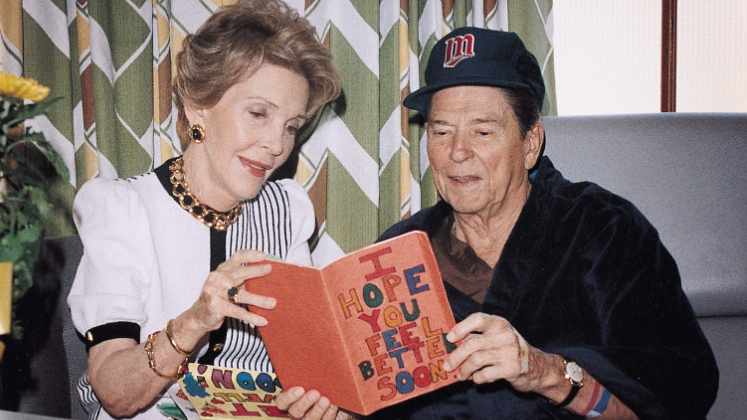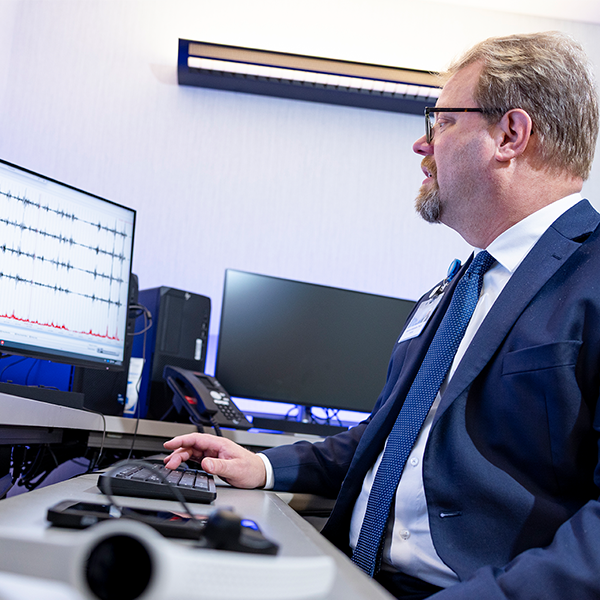-
When a Loved One Has Alzheimer’s Disease, Practical Tips Can Help Patient, Caregiver

ROCHESTER, Minn. — Anyone caring for a loved one with Alzheimer’s disease likely can relate to former first lady Nancy Reagan, who called the illness suffered by former President Ronald Reagan “a truly long, long goodbye.”
Mrs. Reagan, who died Sunday at age 94, was a tireless advocate for Alzheimer’s patients and their families, recalls Mayo Clinic neurologist Ronald Petersen, M.D., Ph.D., who knew the Reagans well. “In many respects, Mrs. Reagan was the optimal caregiver, providing love and support for the president in a fashion similar to many other Americans whose families deal with this difficult diagnosis.”
MEDIA CONTACT: Susan Barber Lindquist, Mayo Clinic Public Affairs, 507-284-5005, newsbureau@mayo.edu.
In 2015, an estimated 5.3 million Americans had Alzheimer's disease, according to the Alzheimer’s Association. As the disease progresses, once-simple tasks become difficult or impossible.
Practical tips can help your loved maintain a sense of independence and dignity.
To limit challenges resulting from Alzheimer’s:
- Schedule wisely.
Establish a routine to make each day more predictable and less confusing. Schedule the most difficult tasks, such as bathing or medical appointments, for the time of day when your loved one is most calm. - Adapt your routine, as needed.
For example, if your loved one insists on wearing the same outfit every day, consider buying a few identical outfits. When your loved one is bathing, switch the worn outfit for a clean one. - Take your time.
Expect things to take longer than they once did. Schedule more time to complete tasks, so you don't need to hurry your loved one. - Involve your loved one.
Allow your loved one to do as much as possible with the least amount of assistance. For example, perhaps your loved one can dress alone if you lay out the clothes in the order they go on. - Limit choices.
The fewer the options, the easier it is to decide. For example, provide two outfits to choose between — not a closet full of clothes. Eliminate belts or accessories that are likely to be put on incorrectly. - Reduce distractions.
Turn off the TV, and minimize distractions at mealtime and during conversations, so your loved one can better focus on the task at hand.
To keep your loved one with Alzheimer’s safe:
- Prevent falls.
Avoid scatter rugs, extension cords and any clutter that could cause your loved one to trip or fall. Install handrails or grab bars in critical areas. - Use locks.
Install locks on cabinets that contain anything potentially dangerous, such as medicine, alcohol, guns, toxic cleaning substances, dangerous utensils and tools. - Check water temperature.
Lower the thermostat on the hot-water heater to prevent burns. - Take fire safety precautions.
Keep matches and lighters out of reach. If your loved one smokes, make sure he or she does so with supervision. Have an accessible fire extinguisher and smoke alarms with fresh batteries.
Caring for the Caregiver
Alzheimer's caregivers need all the support they can get. If you know someone who's caring for a loved one who has Alzheimer's disease, here's how to help:
Be specific when you offer help:
If you want to support a friend caring for a loved one, make a concrete offer. For example:
- “I’m going to the grocery store. What can I pick up for you?”
- “I’ve got a few free hours tomorrow. May I sit in for you, while you run errands or take time for yourself?”
- “I doubled my meatloaf recipe, so I could share with you. I brought enough to last you for several meals.”
- “Does your yard need to be mowed? I'd be happy to take care of it this weekend."
Check in with the caregiver:
Sending a card or calling a caregiver can be a meaningful way to show support. Emails and text messages work, too; however, personal visits can be better. Contact with the outside world can lift a caregiver's spirits.
# # #
About Mayo Clinic
Mayo Clinic is a nonprofit organization committed to medical research and education, and providing expert, whole-person care to everyone who needs healing. For more information, visit http://www.mayoclinic.org/about-mayo-clinic or https://newsnetwork.mayoclinic.org/.
Related Articles







